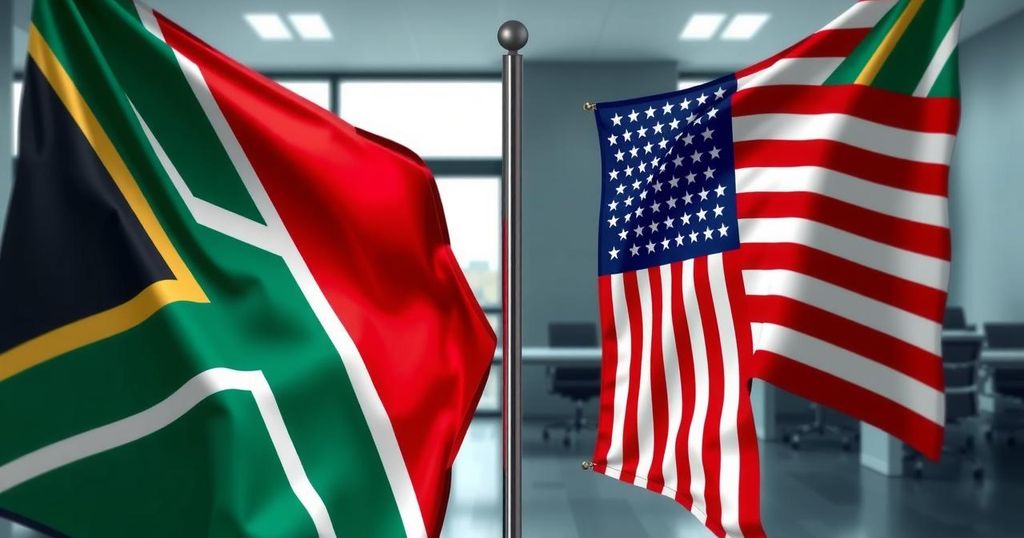Tensions escalate in South Africa following the expulsion of Ambassador Ebrahim Rasool from the US, leading President Cyril Ramaphosa to reassess diplomatic relations. The administration is focusing on improving ties with the Trump administration, addressing sensitive issues like the proposed renaming of Sandton Drive, and navigating internal political dynamics. Key actions planned include restraint in response to Rasool’s return and clearer communication on domestic policies. The upcoming weeks are vital for advancing South Africa’s international interests amid these challenges.
President Cyril Ramaphosa of South Africa finds himself navigating a delicate diplomatic situation following the expulsion of Ebrahim Rasool from the United States. Rasool, who served as the South African ambassador, was declared persona non grata after making derogatory comments about President Donald Trump. This incident has sparked significant diplomatic ramifications, prompting the need for a reassessment of South Africa’s ambassadorial appointment.
On March 20, 2025, Vincent Magwenya, the spokesperson for the Presidency, announced that Rasool must depart the US by March 21. Washington characterized Rasool’s remarks as “obscene and lacking respect.” Ramaphosa is reportedly prioritizing the reset of South Africa’s relations with the Trump Administration, keenly aware of trade opportunities that could arise from enhanced diplomatic ties, as Magwenya noted, “the president is concerned about the current state of relations with the United States.”
The backdrop of Rasool’s expulsion intersects with challenging issues such as South Africa’s Expropriation Act and ongoing legal disputes involving Israel. Despite these tensions, Magwenya assured that engagement channels remain active, and the absence of an ambassador does not signify a cessation of diplomatic efforts. The situation is further complicated by the Johannesburg City Council’s recent proposal to rename Sandton Drive in honor of Palestinian activist Leila Khaled, which raised concerns about straining relations with the US.
Magwenya addressed the proposed street renaming with caution, stating, “the renaming of streets remains one of our democratic society’s redress of the past injustices of colonialism and apartheid.” Nonetheless, he acknowledged the need for caution in handling diplomatic sensitivities to prevent further complications. The ANC intends to hold a rally welcoming Rasool in Cape Town, but the presidency has expressed a desire for restraint in this celebration to alleviate potential diplomatic tensions.
The discourse surrounding South Africa’s foreign policy is intensifying. The Democratic Alliance (DA) has urged the ruling ANC, now in a coalition, to broaden consultations on international matters to address its diminished parliamentary majority. The administration has referred to the current strains in US-South Africa relations as a “hiccup,” outlining a four-point action plan for future diplomatic engagement.
This plan includes maintaining restraint over Rasool’s return, cautiously approaching the street renaming issue, postponing US delegations until trust is restored, and correcting the distorted narratives regarding South Africa’s policies. Public Works and Infrastructure Minister Dean Macpherson has reaffirmed that there have been no expropriations without compensation over the past decade.
As Ramaphosa strives to cultivate a constructive dialogue with the US, he concurrently faces the intricacies of domestic political challenges and international expectations. South Africa’s historical global partnerships, including those with nations scrutinized by the US, remain valued. Magwenya emphasized that South Africa will not abandon long-standing relationships, making it clear that such diplomatic ties transcend current pressures.
The coming weeks will be pivotal as South Africa endeavors to navigate these complex geopolitical dynamics while seeking to improve its relations with the United States and other significant global players.
In conclusion, President Cyril Ramaphosa’s administration is poised at a diplomatic crossroads, compelled to balance internal political pressures while improving strained relations with the United States. With Ebrahim Rasool’s expulsion underscoring the complexities involved, the administration is taking measured steps to restore trust, emphasizing the importance of historical partnerships. As these diplomatic dynamics evolve, Ramaphosa’s strategies will be critical in shaping South Africa’s international standing and fostering constructive engagements in the future.
Original Source: evrimagaci.org






